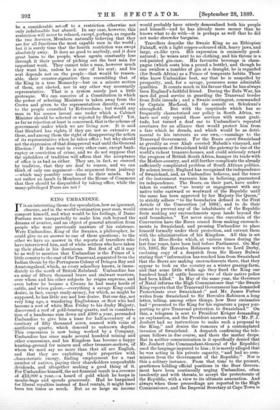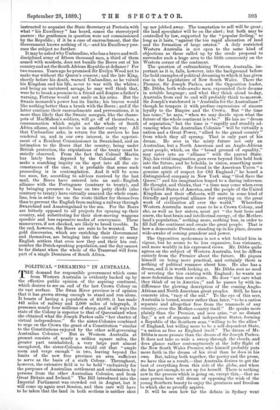KING UMBANDINE.
IT is an interesting theme for speculation, how an ignorant, obscure, and in the world's estimation poor man, would comport himself, and what would be his feelings, if Dame Fortune were unexpectedly to make him rich beyond the dreams of avarice, and an object of general attention from people who were previously unaware of his existence. Were Umbandine, King of the Swazies, a philosopher, he could give us an answer to one of these questions ; to the other we have an answer in the reports of travellers who have interviewed him, and of white settlers who have taken up their abode in his dominions. But first of all it may be as well to mention that Umbandine is the Prince of a little country to the east of the Transvaal, separated from the Indian Ocean by the Portuguese Colony of Delagoa Bay and Amatongaland, which, as every schoolboy knows, is imme- diately to the north of British Zululand. Umbandine has -an army of fifteen thousand brave and stalwart warriors, over whom and his other subjects he reigns supreme, and -even before he became a Crcesus he had many herds of . cattle, and wives galore,—everything a savage King could desire, in fact, except ready-money, for which, as might be - supposed, he has little use and less desire. But one day, not very long ago, a wandering Englishman or Scot who had become a sort of white Man Friday to his dusky Majesty, discovered a reef of gold-bearing quartz, and in considera- tion of a handsome sum down and £300 a year, persuaded Umbandine to give him a lease for half-a-century of a territory of fifty thousand acres, seamed with veins of -auriferous quartz, which descend to unknown depths. "This concession is now being worked by a Company. Umbandine has since made several hundred mining and other concessions, and his Kingdom has become a happy hunting-ground for miners and other treasure-seekers, of whom we need say no more than that all are English, and that they are exploiting their properties with characteristic energy, finding employment for a vast number of natives, paying their shareholders unspeakable dividends, and altogether making a good thing of it. For Umbandine himself, the net financial result is a revenue of £12,000 a year,—a hoard of gold which he keeps in mealie-bags and spends generously. Had he bargained for liberal royalties instead of fixed rentals, it might have been ten times as much. But as so large an income would probably have utterly demoralised both his people and himself—and he has already more money than he knows what to do with—it is perhaps as well that he did not make shrewder bargains.
Travellers describe the Swazie King as an Ethiopian - Falstaff, with a light copper-coloured skin, heavy jaws, and large, ox-like eyes. His expression is eminently good- natured ; he wears next to no clothing, and his throne is a red-painted gin-case. His favourite beverage is cham- pagne (which costs -him a pound a bottle), and though he can swallow a tumbler of gin at a draught, he is regarded (for South Africa) as a Prince of temperate habits. Those who know Umbandine best, say that he is unspoiled by prosperity, and, for a savage, possesses some admirable qualities. It counts much in his favour that he has always been England's faithful friend. During the Zulu War, his men did good service in guarding the Transvaal border from Zulu inroads ; and a Swazie contingent, commanded by Captain MacLeod, led the assault on Sekukuni's stronghold. But with the ineptitude which has so frequently characterised our policy in South Africa, we have not only repaid these services with scant grati- tude, but turned a deaf ear to Umbandine's repeated overtures for an alliance that would protect him from a fate which he dreads, and which would be as detri- mental to his interests as our own,—vassalage to the Transvaal Government. For the Boers covet Swazieland as greedily as ever Ahab coveted Naboth's vineyard, and the possessors of Swazieland hold the gateway to one of the world's richest treasure-houses, and could seriously retard the progress of British South Africa, hamper its trade with the Mother-country, and still further complicate the already sufficiently complicated problem of South African politics. By solemn treaty, England has recognised the independence of Swazieland, and, as Umbandine believes, and the tenor of the instrument warrants him in believing, guaranteed its independence. The Boers, on their part, have under- taken to contract " no treaty or engagement with any native tribe eastward or westward of the Republic until the same has been approved by her Majesty the Queen," to strictly adhere " to the boundaries defined in the First Article of the Convention [of 1884], and to do their utmost to prevent any of the inhabitants of the Republic from making any encroachments upon lands beyond the said boundaries." Yet never since the execution of the Convention have the Boers ceased from making encroach- ments in Swazieland, and pressing Umbandine to place himself formally under their protection, and entrust them with the administration of his Kingdom. All this is set forth in Blue-Books which, at various times during the last four years, have been laid before Parliament. On May 6th, 1885, Sir Hercules Robinson writes to Lord Derby, enclosing copy of a despatch from Sir Henry Bulwer stating that " information has reached him from Swazieland that the Boers are making encroachments there, that they appear to look on the country as a winter grazing-farm, and that some little while ago they fined the King one hundred head of cattle because two of their native police had been killed." In May of the same year, the Governor of Natal informs the High Commissioner that "the Swazie King reports that the Transvaal Government has demanded Protectorate over Swazieland ;" and Mr. James Forbes writes from Swazieland to Sir Hercules Robinson a long letter, telling, among other things, how Boer emissaries had " presented to the King for his signature a paper pur- porting to give Transvaal protection to Swazieland." On this, a telegram is sent to President Kruger demanding an explanation, and the President answers that "Mr. P. J. Joubert had no instructions to make such a proposal to the King," and denies the rumours of a contemplated invasion of Swazieland. A despatch confirming the tele- gram follows in due course, and there the matter drops. But in neither communication is it specifically denied that Mr. Joubert (the Commandant-General of the Republic) used the language imputed to him ; it is merely alleged that he was acting in his private capacity, " and had no com- mission from the Government of the Republic." Nor is this a solitary instance. From that time to the present, gentlemen holding official positions in the Boer Govern- ment have been continually urging Umbandine, often insolently and with threats, to accept the protectorate of the Republic, with a view to its ultimate annexation. And always when these proceedings are reported to the High Commissioner, and the Imperial Secretary at Cape Town is instructed to acquaint the State Secretary at Pretoria with what "his Excellency" has heard, comes the stereotyped answer : the gentlemen in question were not commissioned by the Republic ; if it be a case of encroachment, that the Government knows nothing of it,—and his Excellency pur- sues the subject no further. It may be asked why Umbandine, who has a brave and well- disciplined army of fifteen thousand men, a third of them armed with muskets, does not bundle the Boers out of his country and set the South African Republic at defiance ? For two reasons. Years ago he promised Sir Evelyn Wood not to make war without the Queen's consent; and the late King, shortly before his death, warned Umbandine, as he valued his Kingdom and his life, never to war with the whites ; and being an untutored savage, he may well think that, were he to break a promise to a friend and despise a father's warning, Fortune would not smile on his arms. But the Swazie monarch's power has its limits ; his braves would like nothing better than a brush with the Boers ; and if the latter continue their encroachments and provocations, it is more than likely that the Swazie assegais, like the chasse- pots of MaeMahon's soldiers, will go off of themselves, a consummation which might set the whole of South Africa aflame, and involve us in another costly war. All that Umbandine asks, in return for the services he has rendered us, and in our own interest, is the appoint- ment of a Resident Commissioner in Swazieland, and an intimation to the Boers that the country, being under British protection, the stipulations of the treaty must be strictly observed. From the fact that Colonel Martin has lately been deputed by the Colonial Office to make a searching inquiry on the spot into all the cir- cumstances of the case, it is probable that some such proceeding is in contemplation. And it will be none too soon, for, according to advices received by the last mail, the Boers have entered into an anti - English alliance with the Portuguese (contrary to treaty), and by bringing pressure to bear on two petty chiefs (also contrary to treaty) have virtually annexed the whole coast- line, less in order to use the route thither for themselves than to prevent the English from making a railway through Swazieland and Amatongalaud to the sea. For the Boers are bitterly opposed to all projects for opening up their country, and substituting for their slow-moving waggons speedier and less expensive modes of conveyance. These manceuvres, if not checked, are likely to breed trouble. In the end, however, the Boers are sure to be worsted. The gold discoveries, which are enriching their Government and themselves, are bringing into the country so many English settlers that even now they and their kin out- number the Dutch-speaking population, and the day cannot be far distant when the whole of the Transvaal will form part of a single Dominion of South Africa.







































 Previous page
Previous page